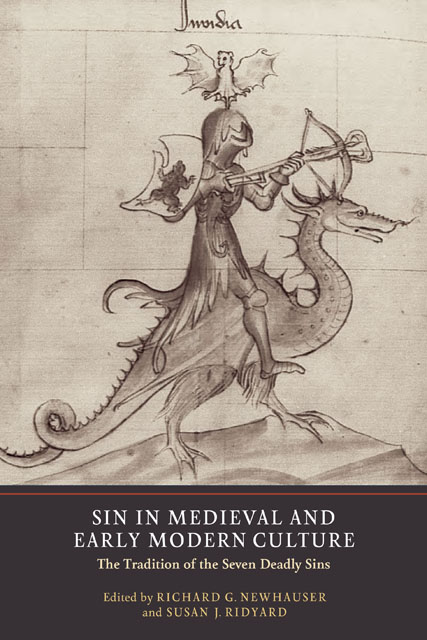2 - The Cultural Career of a ‘Minor’ Vice: Arrogance in the Medieval Treatise on Sin
Published online by Cambridge University Press: 28 February 2023
Summary
This essay explores the conceptualization of arrogance in medieval moral theology as presented in one of its main genres, the treatise on sin and vice. In the period between the fifth and the fifteenth centuries the concept of arrogance was consistently applied to brand as immoral and thus render as illicit power relations and claims, social restructurings and cultural forms, denied validity by mainstream moral theology for social reasons. Initially subsumed under the concept of pride, arrogance gradually uncoupled itself and became the moral playground of the competition for agency. Tracing the main stages of arrogance’s conceptual evolution, the essay highlights how the treatises on sin and vice, through their formulation of arrogance, reflected on the relationship between social dynamics and normative value within a series of specific historical contexts: Merovingian political theology, Carolingian state-building, the twelfth-century clash between rationalism and mysticism, the erosion of status society and the high medieval order and the diffusion of legitimacy-producing discourses in the late Middle Ages.
Modern Western value theory, still in many ways an intellectual heir of sacred ethics, has come a long way from the medieval Christian theory of vice. It has come to valorize positively almost the entire host summed up in the medieval theory of the seven deadly sins. A different ‘moral arithmetic’, to use John Bossy’s apt phrase, applies today. Pride is lauded. Avarice, its old rival forleadership of the deadly sins, is reveled in. The rest of the sins, formerly capital, mortal, venial or other, are lukewarmly embraced. In the period from the fourteenth to the twentieth century the old vices, one after another, lost their reprehensibility and became virtues. Capitalism, egalitarianism, consumerism, class, hedonism, democracy, secularization and social mobility shored up a new value set. Except, that is, for a short list of exceptions. Arrogance ranks very highly on that list. True, it has lost its theological gravity and its moral core is significantly lighter. And yet arrogance still appears to engender more moral indignation than any of the other venerable vices of the old theological set. This should not be surprising, remembering how it began – as a main modality, if not chief incarnation, of that fountainhead of vice, pride. Given pride’s cultural career, however, such a valuation of arrogance is somewhat startling.
- Type
- Chapter
- Information
- Sin in Medieval and Early Modern CultureThe Tradition of the Seven Deadly Sins, pp. 43 - 64Publisher: Boydell & BrewerPrint publication year: 2012

